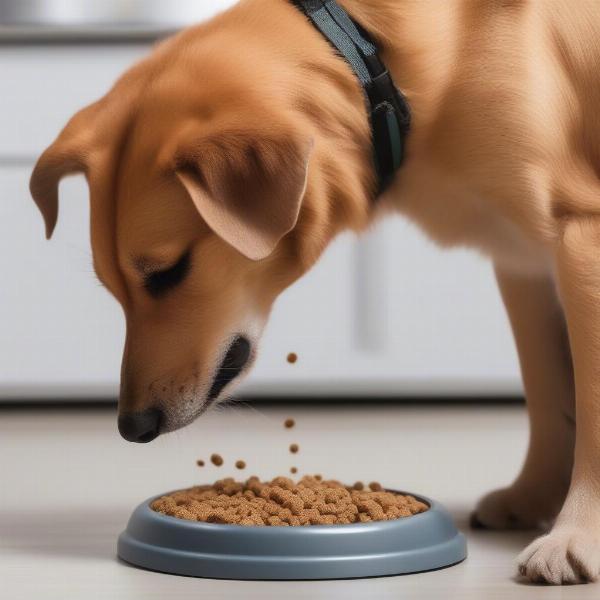Slow feeding dog bowls are designed to do exactly what their name suggests: slow down your dog’s eating. But why is this important? Many dogs, especially those who gobble their food, can benefit from a slow feeder. This simple change can have a surprisingly positive impact on your dog’s health and well-being.
Why Use a Slow Feeding Dog Bowl?
For many dog owners, mealtime is a whirlwind of gulping and gobbling. While it might seem harmless, this rapid eating habit can lead to several health issues. A slow feeding dog bowl can help prevent:
- Bloat: This life-threatening condition occurs when a dog’s stomach fills with gas and twists, cutting off blood supply. Eating too quickly can contribute to bloat.
- Vomiting: Dogs who eat too fast often regurgitate their food shortly after finishing their meal. A slow feeder can help prevent this messy problem.
- Choking: Large pieces of kibble can become lodged in a dog’s throat if they swallow without chewing properly. Slow feeders encourage more deliberate eating.
- Obesity: By prolonging mealtime, slow feeders can help dogs feel fuller for longer, potentially aiding in weight management.
Choosing the Right Slow Feeding Dog Bowl
With so many slow feeders on the market, finding the right one can feel overwhelming. Consider these factors:
- Material: Look for durable, non-toxic materials like stainless steel, ceramic, or food-grade plastic.
- Design: Different designs offer varying levels of difficulty. Start with a simpler design if your dog is new to slow feeding.
- Size: Choose a bowl that is appropriately sized for your dog’s breed and food intake.
- Ease of Cleaning: Opt for a bowl that is dishwasher safe or easy to hand wash.
Introducing Your Dog to a Slow Feeder
Switching to a slow feeder should be a gradual process. Start by mixing a small amount of food in the slow feeder with the rest in their regular bowl. Gradually increase the proportion of food in the slow feeder over several days. This allows your dog to adjust to the new eating style without becoming frustrated.
Are Slow Feeding Bowls Right for Every Dog?
While slow feeders are beneficial for many dogs, they might not be suitable for every dog. Consult your veterinarian if your dog has:
- Dental issues: Some slow feeders may be difficult for dogs with missing teeth or other dental problems to navigate.
- Anxiety around food: A slow feeder might exacerbate anxiety in dogs who are already stressed about mealtimes.
- Certain medical conditions: Always check with your vet if your dog has any underlying health conditions before introducing a slow feeding bowl.
 Dog using a slow feeding bowl
Dog using a slow feeding bowl
Is a Slow Feeding Bowl Worth It?
For many dogs, the answer is a resounding yes. A slow feeding dog bowl is a simple, affordable way to improve your dog’s mealtime experience and potentially prevent serious health issues.
FAQ
- How do I clean a slow feeding dog bowl? Most slow feeders are dishwasher safe or can be easily cleaned with soap and water.
- What if my dog gets frustrated with the slow feeder? Try a simpler design or mix their food with a small amount of water or wet food to make it easier to access.
- Can puppies use slow feeders? Yes, but choose a size and design appropriate for their age and breed.
- Are there different types of slow feeders? Yes, there are various designs, including maze bowls, raised ridges, and puzzle feeders.
- How often should I replace my dog’s slow feeder? Replace it if it becomes damaged or shows signs of wear and tear.
- Can I use a slow feeder for wet food? Yes, but some designs may be more suitable for wet food than others.
- My dog is still eating too fast, even with a slow feeder. What should I do? Try a more challenging design or consult your veterinarian.
ILM Dog is a leading online resource for dog owners worldwide, offering expert advice on all aspects of canine care, from breed selection and health to training, nutrition, and grooming. Whether you’re a seasoned dog owner or just starting out, ILM Dog provides the information you need to ensure your furry friend lives a happy, healthy life. We offer expert advice in various areas such as breed selection, health and medical care, training and behavior, nutrition and feeding, grooming and hygiene, and product recommendations. Contact us at [email protected] or +44 20-3965-8624 for expert advice tailored to your dog’s specific needs.